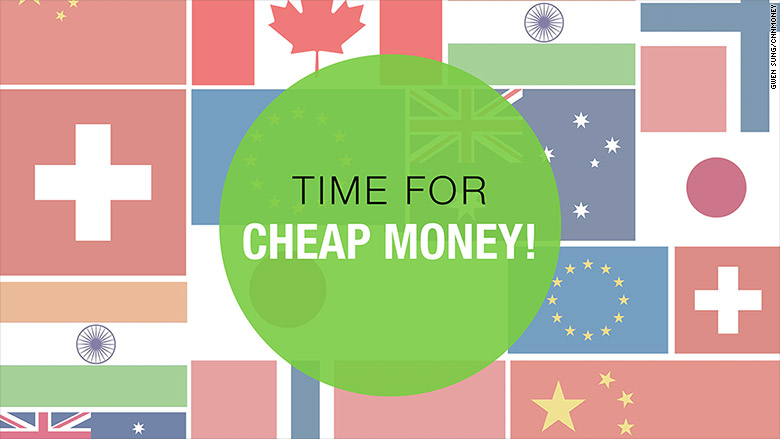
Central bankers are swooping to the rescue of shaky economies, soothing investor panic for now but highlighting a global addiction to easy money.
China stepped in to shore up its flagging economy this week after a sharp stock plunge and fears about slowing growth triggered waves of selling across global markets. Authorities cut interest rates -- for the fifth time in just nine months -- and lowered the amount banks need to hold in reserve in a bid to boost borrowing.
China isn't alone in its actions. Policymakers in countries that produce nearly half the output in the world's $77 trillion economy are working to stimulate lending and spur growth.
Related: China contagion: How it ripples across the world
Central banks in Canada, India, Australia, and Norway have cut interest rates this year and most of those countries are expected to ease further. Rates in Switzerland have languished in negative territory since late last year. And policymakers in Europe and Japan are printing money as a tool to support growth.
The efforts illustrate cracks in the world economy. Five of the seven biggest economies are in cheap money mode, while the U.S. and the U.K. remain stuck in neutral -- at least for now.
The U.S. was on track to raise rates as early as next month, but the problems plaguing China and rest of world may put that off. On Wednesday, president of the New York Federal Reserve William Dudley poured cold water on an imminent rate rise, though more clues could come this week when Fed policymakers gather for their annual retreat in Jackson Hole, Wyoming.
Related: Is the Fed trapped now? Rate hike remains elusive
The central bank hasn't increased its benchmark interest rate in nearly a decade. Any move up would be considered a signal that the U.S. economy is healthy and is on its way to recovery from the recession.
Any upcoming rate hike in Britain could also be on ice.
"If the Fed does delay in response to Chinese developments, the case for our expectation that [U.K. interest rates] will not rise to the second-quarter of 2016 looks even stronger," said Oxford Economics economist Martin Beck.
The European Central Bank is prepared to do more to combat rising economic turbulence. The bank's chief economist and executive board member Peter Praet said Wednesday it stands ready to expand its bond-buying program if needed.
The ECB has been pumping about 60 billion euros a month into European markets since March. It's trying to boost eurozone inflation and growth by making it even cheaper for governments and companies to borrow money.
Cheap oil is exacerbating the woes for many countries. Oil prices have lost about 25% this year, causing plenty of pain for energy-dependent economies like Canada, Russia and Norway. Crude's sharp drop sounds a warning that global demand is light and growth is slowing.


